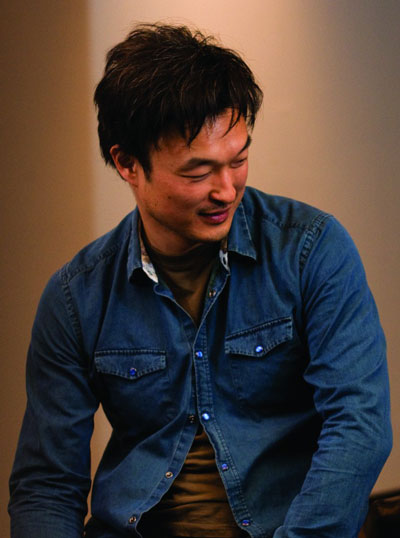It's no surprise that the CBC series Kim’s Convenience, about a Korean-Canadian family who run a corner store in downtown Toronto, was a breakout hit last fall. It’s a fresh, funny take on the familiar immigrant experience. But more than an entertaining collision of cultures, it’s a heartfelt story about a loving yet fractured family.
Mr. and Mrs. Kim (known as “Appa” and “Umma”—Korean for dad and mom) came to Canada to build a better life for their children, Jung and Janet, now in their 20s. Appa (Paul Sun-Hyung Lee) is hardworking, opinionated and stubborn. Umma (Jean Yoon) is kind, involved at church and eager to find a cool, Korean, Christian boyfriend for Janet (Andrea Bang), who is studying photography at university.
But there is a rift in the family. Jung (Simu Liu) and Appa haven’t spoken since Jung stole money from the store as a rebellious teenager and left home.
Mr. and Mrs. Kim (known as “Appa” and “Umma”—Korean for dad and mom) came to Canada to build a better life for their children, Jung and Janet, now in their 20s. Appa (Paul Sun-Hyung Lee) is hardworking, opinionated and stubborn. Umma (Jean Yoon) is kind, involved at church and eager to find a cool, Korean, Christian boyfriend for Janet (Andrea Bang), who is studying photography at university.
But there is a rift in the family. Jung (Simu Liu) and Appa haven’t spoken since Jung stole money from the store as a rebellious teenager and left home.
“See? Destiny!”
Kim’s Convenience is based on the award-winning play by Ins Choi.
“It’s the Prodigal Son story set in Regent Park, in a Korean family,” the actor, playwright and Christian says. “It’s funnier, but I owe Jesus some royalties because He told the story first.”
Ins was born in Seoul, South Korea, and grew up in Toronto. “My parents came to Canada with $200, a pocketful of English and a lot of love, hope and faith,” he recently told an audience who came to see one of his plays. Although they didn’t own a convenience store, his uncle and the families of many friends did. Appa is a blend of his father, uncle and the men at the church his parents planted.
Ins comes from a long line of pastors. “I’m the son of a preacher man—and grandson, and nephew, and cousin,” he says. “Whenever we get together, everyone talks and nobody listens.” Ins’ mother wanted him to be a preacher, too. She had prayed for a son and promised to dedicate him back to God if He answered her prayer. “She said it was my destiny,” he recalls. When Ins didn’t get into university the first time, he was discouraged. His mom’s reply: “See? Destiny!”
Part of a Tradition
Ins attended Bible college, where he fell in love with acting and went on to study theatre at York University in Toronto. After graduation, he began auditioning and pursued an acting career but quickly grew frustrated with the stereotypical parts available for Asian-Canadians.
For several years, he worked as a children’s pastor at his dad’s church while studying part-time toward a master of divinity degree at Wycliffe College in Toronto. As he wrestled with his call—pastor or performer—the professors were supportive.
“They embraced and encouraged me in the path of being an artist,” he told Insight, Wycliffe’s alumni magazine. “For an Old Testament course, instead of writing book reports, I wrote skits. I pretended I was Jeremiah, or Isaiah, utilizing skills I had.”
He began to realize he was part of a long tradition of faith in the arts. “There are those who went before me who were gifted in the arts and, as well, wanted to follow Christ and make the love of God known to His world, in whatever form,” he says. He transferred to the master of theological studies program and graduated in 2002.
 "I wrote Kim's Convenience so that I could have a job—because no one else was writing a vehicle for me," says Ins Choi
"I wrote Kim's Convenience so that I could have a job—because no one else was writing a vehicle for me," says Ins Choi
Ins started writing Kim’s Convenience as part of a playwriting unit with the fu-GEN Asian Canadian Theatre Company in 2006. “I wrote it so that I could have a job—because no one else was writing a vehicle for me,” he told the Canadian Press.
He worked on it for many years while performing with several theatre companies, including the Stratford Festival and Soulpepper. In 2010, he sent Kim’s Convenience to every major theatre company in Toronto. They all rejected it.
So in 2011, he entered it in the Toronto Fringe Festival, where it won the New Play contest and the Patron’s Pick award. That led to sold-out shows, a national tour, more awards, a book and the TV show—the first Canadian series to have an entirely Asian main cast.
“When I was a kid, the only Asian on TV was David Suzuki,” Ins says. “There was this opportunity for us to change the colour of your TV. I’m so grateful to be involved in that—it has been such a celebration.”
Ins still struggles with what it means to be a Christian and an artist. During a question and answer period after performing Subway Stations of the Cross—a one-man show where he transforms into a street prophet—he pondered if there was such a thing as “Christian” art.
“I still wrestle with my part—why I’m here, what I do, how it involves the gospel,” he says. “I feel like I’m more useful being in the world as a Christian, rather than being in the church or being a preacher.” What he brings to his work is a “baptized imagination,” as theologian C.S. Lewis described it.
The first season of Kim’s Convenience introduced us to a family living with the messy consequences of broken trust and struggling with forgiveness. In the last episode, we see hints of a move toward reconciliation, as Umma, Jung and Janet sing a beautiful Korean hymn in church. Will the prodigal son return? Will the family be made whole again? Watch the second season, airing this fall, to find out.










Comment
On Friday, February 5, 2021, Marilyn Fox said:
Leave a Comment